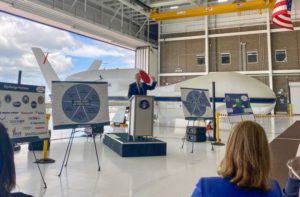
U.S. Sen. John Hoeven (R-ND) on Aug. 24 marked the arrival of all 20 Global Hawk Block 30 aircraft at Grand Sky, the nation’s first unmanned aircraft system (UAS)-specific business and aviation park located at Grand Forks Air Force Base near Grand Forks, N.D.
During the event, Sen. Hoeven hosted Test Resource Management Center (TRMC) Director George Rumford to celebrate the arrival of the aircraft, which will be used for the Sky Range hypersonic missile testing program. TRMC oversees the infrastructure needed to test U.S. weapons systems.
“With the arrival of these Global Hawk Block 30s, the Sky Range program is moving full steam ahead to transform the way our nation tests hypersonic missiles,” Sen. Hoeven said on Wednesday. “We appreciate the hard work of Director Rumford in making this program a reality.”
According to information provided by the senator’s staff, the U.S. Department of Defense (DOD) currently uses an aging fleet of ships deployed across a Pacific Ocean corridor to test hypersonic missiles. DOD is only able to conduct four to six tests per year due to time and financial constraints.
The Sky Range program will replace the ships with modified Global Hawks, which can deploy quickly, more frequently and at a lower cost, according to the information.
These aircraft, said Sen. Hoeven, “put us in a strong position as we made the case to DOD for bringing the Global Hawk fleet to Grand Sky for Sky Range.”
He also stressed the importance of the hypersonic missile program in ensuring the nation can continue to effectively counter its adversaries.
“This is critical to the future security of our country, and Grand Forks is at the center of this effort due to the unmatched UAS ecosystem that we’ve built and the partnerships that we’ve established in this region,” Sen. Hoeven said.
According to his staff, the Sky Range program builds upon the coordinated efforts that Sen. Hoeven has worked to establish between federal, state, military, private, and academic partners in the region to bolster both national defense and the local economy.



